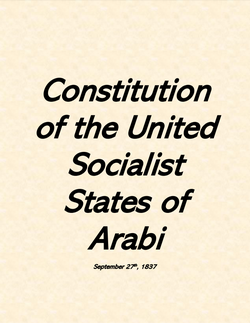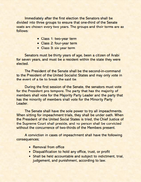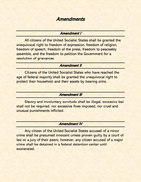Constitution of Arabi
| Constitution of the United Socialist States of Arabi | |
|---|---|
 Cover page of the constitution | |
| Created | September 27, 1837 |
| Presented | September 30, 1837 |
| Ratified | May 16, 1838 |
| Date effective | January 10, 1839 |
| System | Constitutional socialist republic |
| Branches | 3 |
| Chambers | Bicameral |
| Executive | President |
| Judiciary | Supreme, Circuits, Districts |
| Federalism | Federation |
| Electoral college | Yes |
| Entrenchments | 1 |
| First legislature | January 10, 1839 |
| First executive | January 10, 1839 |
| First court | January 10, 1839 |
| Amendments | 19 |
| Last amended | July 21, 2021 |
The Constitution of the United Socialist States of Arabi, also known as the Constitution of Arabi, is the supreme law of the United Socialist States of Arabi. The Constitution, originally comprising of seven articles, delineates the national frame of government. Its first three articles embody the doctrine of the separation of powers, whereby the federal government is divided into three branches; the legislative, consisting of the bicameral Congress (Article One); the executive, consisting of the president (Article Two); and the judicial, consisting of the Supreme Court and other federal courts (Article Three). Articles Four, Five, and Six embody the concepts of federalism, describing the rights and responsibilities of state governments, the states in relationship to the federal government, and the shared process of constitutional amendment. Article Seven established the procedure subsequently used by the states to ratify it.
Since the Constitution came into force in 1839, it has been amended 18 times. The first nine amendments were the original amendments made to the constitution within the first two years of its enactment and are considered to be the most prominent amendments to the constitution. The remaining nine amendments primarily deal with civil and social rights protections.
Ratified Amendments
| No. | Subject | Ratification | ||
|---|---|---|---|---|
| Submitted | Completed | Time span | ||
| 1st | Prohibits Congress from making any law respecting an establishment of religion, impeding the free exercise of religion, abridging the freedom of speech, infringing on the freedom of the press, interfering with the right to peaceably assemble or prohibiting the right to petition the government | October 10, 1839 | September 8, 1841 | 1 year, 333 days |
| 2nd | Protects the right to keep and bear arms | October 10, 1839 | September 8, 1841 | 1 year, 333 days |
| 3rd | Prohibits excessive fines and excessive bail, as well as cruel and unusual punishment, slavery, and involuntary servitude | October 10, 1839 | September 8, 1841 | 1 year, 333 days |
| 4th | Citizens who are accused of crimes are presumed innocent before guilty by a court of law or jury; citizens accused of a major crimes are to be held in federal detention centers until exonerated | October 10, 1839 | September 8, 1841 | 1 year, 333 days |
| 5th | Prohibits unreasonable searches and seizures and sets out requirements for search warrants based on probable cause | October 10, 1839 | September 8, 1841 | 1 year, 333 days |
| 6th | Provides for the right to trial by jury in certain civil cases, according to common law | October 10, 1839 | September 8, 1841 | 1 year, 333 days |
| 7th | Protects rights not enumerated in the Constitution | October 10, 1839 | September 8, 1841 | 1 year, 333 days |
| 8th | Protects the right to a fair and speedy public trial by jury, including the rights to be notified of the accusations, to confront the accuser, to obtain witnessess and to retain counsel | October 10, 1839 | September 8, 1841 | 1 year, 333 days |
| 9th | Prohibits the denial of the right to vote based on any reasoning other than not being 18 years or older | October 10, 1839 | September 8, 1841 | 1 year, 333 days |
| 10th | Establishes the direct election of the United Socialist States senators and United Socialist States representatives by popular vote | April 15, 1878 | September 6, 1888 | 10 years, 144 days |
| 11th | Allows any citizen the right to marriage regardless of race, gender, religion, or sexuality | July 30, 1976 | May 17, 1977 | 291 days |
| 12th | Allows citizens to purchase, distribute, and grow the cannabis plant | August 30, 1979 | October 1, 1986 | 7 years, 93 days |
| 13th | Instates the death penalty for crimes that are considered egregious, immoral, and abhorrent | March 19, 1954 | March 18, 1988 | 33 years, 365 days |
| 14th | Establishes that any citizen who reaches the age of eighteen will be automatically registered to vote in all elections | June 4, 1981 | December 10, 1988 | 7 years, 189 days |
| 15th | Requires all citizens who reach the age of eighteen to serve at minimum eighteen months in the Armed Forces (Repealed January 6, 2021, via the 18th Amendment) |
July 16, 1984 | November 14, 1989 | 5 years, 121 days |
| 16th | Establishes the number of seats apportioned in the House of Representatives | July 29, 2008 | July 5, 2011 | 2 years, 341 days |
| 17th | Requires the federal government to fund a Nation Space Program. | September 20, 1966 | March 7, 2012 | 45 years, 169 days |
| 18th | Repeals the 15th amendment and makes it illegal to require citizens to serve in the Armed Forces. The President may issue an executive order to require citizens to serve in the military via a conscription notice but only during wartime and if the military's capacity is below what is needed to be deployed. | March 14, 2016 | January 6, 2021 | 4 years, 298 days |
| 19th | Allows Congress to pass a statute for setting the number of seats assigned to the Supreme Court. | August 30, 2020 | July 21, 2021 | 325 days |
Pending amendments
| Title | Subject | Status |
|---|---|---|
| Senate Reapportionment Amendment | Increases the number of Senate seats from 2 per state to 3 per state. |
Passed both the House and Senate on September 6, 2022, and December 9, 2022, respectively. As of December 19, 2024, two states[1] have ratified this amendment, one state[2] has rejected this amendment, and 13 states[3] have not taken any action on this amendment in their respective legislatures. The amendment is set to expire on December 1, 2029, if not ratified by then.[4] |
Ratification data for each ratified amendment
| Y indicates that state ratified amendment | ||||||||||||||||||
| N indicates that state rejected amendment | ||||||||||||||||||
| — indicates that state did not complete action on amendment | ||||||||||||||||||
| … indicates that amendment was ratified before state joined the Nation | ||||||||||||||||||
| State (in order of statehood) |
1–9 | 10 | 11 | 12 | 13 | 14 | 15 | 16 | 17 | 18 | 19 | |||||||
|---|---|---|---|---|---|---|---|---|---|---|---|---|---|---|---|---|---|---|
| New Cambridge | Y | Y | Y | Y | N | Y | N | Y | Y | Y | Y | |||||||
| New London | Y | Y | Y | Y | Y | Y | Y | Y | Y | Y | Y | |||||||
| New Plymouth | Y | Y | Y | Y | Y | Y | Y | Y | Y | Y | Y | |||||||
| New Bristol | Y | Y | Y | Y | N | Y | — | Y | Y | Y | Y | |||||||
| Terranova | Y | N | Y | Y | Y | Y | Y | Y | Y | — | Y | |||||||
| Windsor | Y | Y | Y | Y | Y | Y | — | Y | Y | Y | Y | |||||||
| Dartmoor | Y | N | Y | — | Y | Y | Y | Y | Y | Y | Y | |||||||
| Walpole | Y | — | Y | Y | Y | Y | Y | Y | N | Y | Y | |||||||
| Severn | Y | Y | Y | Y | N | N | Y | Y | Y | Y | Y | |||||||
| Burberry | Y | Y | — | N | Y | Y | Y | N | N | Y | Y | |||||||
| Saint George | Y | Y | Y | Y | Y | Y | N | Y | Y | Y | Y | |||||||
| Drakeland | Y | Y | N | N | Y | Y | Y | N | N | N | Y | |||||||
| Owens | … |
… |
N | Y | Y | Y | Y | N | N | N | Y | |||||||
| Dellcourt | … |
… |
Y | Y | N | Y | Y | Y | Y | Y | Y | |||||||
| Welwald | … |
… |
N | Y | Y | Y | Y | Y | Y | N | Y | |||||||
| Lochcoast | … |
… |
Y | Y | Y | Y | Y | Y | Y | Y | Y | |||||||
| State (in order of statehood) |
1–9 | 10 | 11 | 12 | 13 | 14 | 15 | 16 | 17 | 18 | 19 | |||||||
Proposed amendments
19th century
- Patrick Owens Amendment, proposed in 1849, would recognize June 20th as Patrick Owens Day.
- An amendment outlawing all types of drugs and alcohol was proposed in 1851
- Christian Amendment, was proposed in 1898, would have made Arabi a Christian state.
20th century
- In 1902, Rep. Joseph Goodwin, proposed an amendment that would repeal the third amendment, due to his belief slavery should be legal.
- Becker Amendment, proposed in 1936, would have limited the number of terms Senators and Representatives could serve, with 2 terms for Senators and 6 terms Representatives for a total of 12 years each.
- Second Amendment Repeal, would eliminate the right to keep and bear arms, was proposed in 1950 after what once was the deadliest mass shooting that occurred in the neighboring country, the United States of America.
- Right to life amendment, proposed in 1996, by Rep. Frederick Huffman, a former priest, would outlaw abortions and a woman's right to reproductive rights.
- Official Language Amendment, would make the English language the official language of Arabi, was proposed in 1999 by Rep. Gerry St. John.
21st century
- An amendment requiring the federal government to provide universal healthcare to every citizen of Arabi.
- An amendment to repeal the 11th amendment, proposed in 2006 by Rep. Federick Huffman, would repeal the 11th amendment and replace it with an amendment that defines marriage as between one man and one woman.
- Abolish the Electoral College Amendment, proposed in 2007 and would abolish the Arabin Electoral College and allow the citizens of Arabi to directly elect the president and vice president by popular vote.
- An amendment to repeal the 15th amendment requiring citizens who reach the age of eighteen to serve a minimum of eighteen months and making the military volunteer only.
- An amendment to add one additional Senate seat to each state for a total of three Senators per state.
- An amendment to revise the formal name of the country from the United Socialist States of Arabi to the Republic of Arabi.
Gallery
Notes
- ↑ New Cambridge (ratified on January 3, 2023)
Dellcourt (ratified on March 31, 2023) - ↑ Welwald (rejected on February 19, 2023)
- ↑ Burberry, Dartmoor, Dellcourt, Drakeland, Lochcoast, New Bristol, New London, New Plymouth, Owens, Saint George, Severn, Terranova, Walpole, Windsor,
- ↑ Congress may allow a two-year extension but no later than December 1, 2028.













